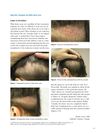 September 2005 in “Hair transplant forum international”
September 2005 in “Hair transplant forum international” A good hair transplant assistant is skilled and knowledgeable in the field.
 July 2003 in “Hair transplant forum international”
July 2003 in “Hair transplant forum international” PEMA handles on syringes improve comfort and efficiency in hair transplant procedures.
 November 1997 in “Archives of Dermatology”
November 1997 in “Archives of Dermatology” The book provides basic insights into hair transplant surgery but is not detailed enough to be a complete guide for surgeons.
November 1994 in “Hair transplant forum international” The document's conclusion cannot be determined as the content is not available.
 November 2019 in “Quality in primary care”
November 2019 in “Quality in primary care” Scalp micropigmentation is a tattooing method that can mimic a full head of hair without surgery and has no healing time.
April 2019 in “kufa Journal for Nursing sciences” FUE hair transplant is effective and safe for treating hair loss.
January 2019 in “Clinical pediatric dermatology” Scalp micropigmentation is a non-surgical alternative to hair transplants that mimics hair follicles and requires no downtime.
January 2020 in “Journal of Womens Health, Issues and Care” Scalp micropigmentation is a successful, non-surgical way to make hair look fuller.
 November 2013 in “Journal of clinical & experimental dermatology research”
November 2013 in “Journal of clinical & experimental dermatology research” Using urinary bladder matrix and platelet rich plasma can effectively treat transplant scars and prevent hair loss.
 9 citations,
April 2000 in “Plastic and Reconstructive Surgery”
9 citations,
April 2000 in “Plastic and Reconstructive Surgery” The document concludes that appearance can be significantly improved after one hair restoration correction procedure, but often multiple operations are needed for the best results.
 6 citations,
June 2017 in “Actas dermo-sifiliográficas/Actas dermo-sifiliográficas”
6 citations,
June 2017 in “Actas dermo-sifiliográficas/Actas dermo-sifiliográficas” Transplanting hair follicles into chronic ulcers helps them heal better.
 6 citations,
March 2008 in “Dermatologic Surgery”
6 citations,
March 2008 in “Dermatologic Surgery” Transplanting chest hair into scars can effectively treat wide donor scars from hair restoration surgery.
 4 citations,
January 2007 in “Indian Journal of Dermatology”
4 citations,
January 2007 in “Indian Journal of Dermatology” Body hair can be used as an extra source of donor hair in hair restoration surgery for people with severe hair loss.
 1 citations,
January 2017 in “Journal of Aesthetic & Reconstructive Surgery”
1 citations,
January 2017 in “Journal of Aesthetic & Reconstructive Surgery” Combining FUT and FUE hair transplant methods in one session provides more grafts and higher patient satisfaction.
 1 citations,
January 2015 in “Hair therapy & transplantation”
1 citations,
January 2015 in “Hair therapy & transplantation” Many hair transplant patients are unhappy due to clinical mistakes and the need for better training of surgical assistants is crucial.
 18 citations,
May 2016 in “Aesthetic Surgery Journal”
18 citations,
May 2016 in “Aesthetic Surgery Journal” Body hair transplantation is an effective method for restoring hair in people with severe baldness and limited scalp donor hair.
3 citations,
December 2013 in “Annals of plastic surgery” The new hair transplant method improves results and reduces surgery time.
 1 citations,
January 2020 in “Skin appendage disorders”
1 citations,
January 2020 in “Skin appendage disorders” Hair transplants for male baldness can show inflammation and fibrosis, but more research is needed to confirm LPP presence.
 January 2010 in “Springer eBooks”
January 2010 in “Springer eBooks” Pubic hair transplantation can help women with little to no pubic hair, using scalp hair for a natural look and requires careful aftercare.
October 2021 in “Indian Journal of Plastic Surgery” Trichoscopy helps hair transplant surgeons diagnose hair loss types and assess donor hair quality.
 51 citations,
November 2010 in “Dermatologic Surgery”
51 citations,
November 2010 in “Dermatologic Surgery” The research provides specific measurements for hair follicles that can improve hair transplant and regeneration techniques.
3 citations,
April 2000 in “Plastic and Reconstructive Surgery” November 2024 in “Actas Dermo-Sifiliográficas” July 2011 in “F1000Research”  April 2000 in “Plastic and Reconstructive Surgery”
April 2000 in “Plastic and Reconstructive Surgery” The document explains how to fix common issues in hair transplant surgery.
August 2022 in “Aesthetic Plastic Surgery”  64 citations,
January 2005 in “International Journal of Dermatology”
64 citations,
January 2005 in “International Journal of Dermatology” Hair transplant destroyed by lichen planopilaris.
 32 citations,
July 2011 in “Facial Plastic Surgery”
32 citations,
July 2011 in “Facial Plastic Surgery” New hair transplant methods offer more natural results and better graft survival, with ongoing research to increase donor hair options.
 28 citations,
July 2011 in “Journal of Plastic Reconstructive and Aesthetic Surgery”
28 citations,
July 2011 in “Journal of Plastic Reconstructive and Aesthetic Surgery” A patient had skin tissue death at the hair removal site after a hair transplant, which was treated with surgery.
 25 citations,
January 2009 in “Oral and Maxillofacial Surgery Clinics of North America”
25 citations,
January 2009 in “Oral and Maxillofacial Surgery Clinics of North America” Successful hair transplant surgery depends on careful patient selection, proper surgical plan and technique, and attentive aftercare.




















